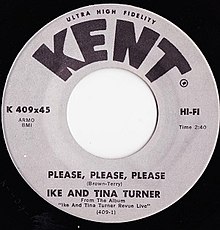
"I'll Be Doggone" is a 1965 song recorded by the American soul singer Marvin Gaye and released on the Tamla label. The song talks about how a man tells his woman that he'll be "doggone" about simple things but if she did him wrong that he'd be "long gone". The song was written by Miracles members Smokey Robinson, Pete Moore and Marv Tarplin, initially for The Temptations, who rejected the song.

Live at the Apollo is the first live album by James Brown and the Famous Flames, recorded at the Apollo Theater in Harlem in October 1962 and released in May 1963 by King Records. Capturing Brown's popular stage show for the first time on record, the album was a major commercial and critical success and cemented his status as a leading R&B star.
Bobby Howard Byrd was an American rhythm and blues, soul and funk singer, songwriter, musician, record producer, bandleader, and talent dedicated. He played a part in the development of soul and funk music in association with James Brown.

The Famous Flames were an American rhythm and blues, soul vocal group founded in Toccoa, Georgia, in 1953 by Bobby Byrd. James Brown first began his career as a member of the Famous Flames, emerging as the lead singer by the time of their first appearance in a professional recording, "Please, Please, Please", in 1956.
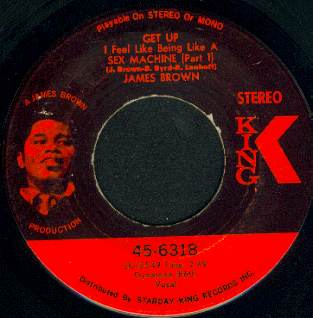
"Get Up Sex Machine" is a funk song recorded by James Brown with Bobby Byrd on backing vocals. Released as a two-part single in 1970, it was a no. 2 R&B hit and reached no. 15 on the Billboard Hot 100.
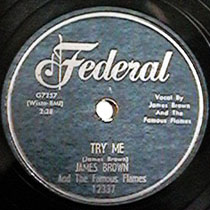
"Try Me", titled "Try Me (I Need You)" in its original release, is a song recorded by James Brown and the Famous Flames in 1958. It was a #1 R&B hit and charted #48 Pop—the group's first appearance on the Billboard Hot 100. It was Brown and the Flames' second charting single, ending a two-year dry spell after the success of "Please, Please, Please".
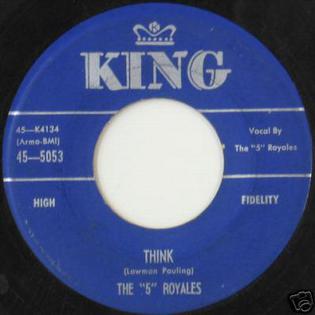
"Think" is a rhythm and blues song written by Lowman Pauling and originally recorded by his group the "5" Royales. Released as a single on King Records in 1957, it was a national hit and reached number nine on the U.S. R&B chart.
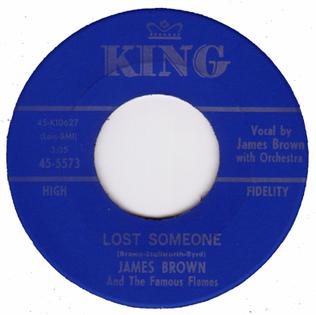
"Lost Someone" is a song recorded by James Brown in 1961. It was written by Brown and Famous Flames members Bobby Byrd and Baby Lloyd Stallworth. Like "Please, Please, Please" before it, the song's lyrics combine a lament for lost love with a plea for forgiveness. The single was a #2 R&B hit and reached #48 on the pop chart. According to Brown, "Lost Someone" is based on the chord changes of the Conway Twitty song "It's Only Make Believe". Although Brown's vocal group, The Famous Flames did not actually sing on this tune, two of them, Bobby Byrd, and "Baby Lloyd " Stallworth, co-wrote it with Brown, and Byrd plays organ on the record, making it, in effect, a James Brown/Famous Flames recording.

"Out of Sight" is a funk song recorded by James Brown in 1964. A twelve-bar blues written by Brown under the pseudonym "Ted Wright", the stuttering, staccato dance rhythms and blasting horn section riffs of its instrumental arrangement were an important evolutionary step in the development of funk music.
Over the course of his career James Brown owned and operated several different record labels, which he used primarily to release his own productions of artists associated with his revue.
"Shout and Shimmy" is an R&B song written by James Brown, and recorded by him and The Famous Flames. It rose to #16 on the R&B chart and #61 on the Billboard Hot 100.
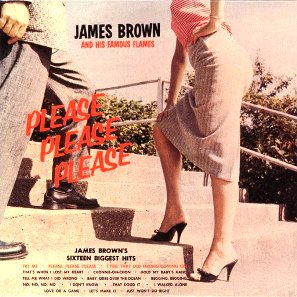
Please Please Please is the debut studio album by the Famous Flames under the billing "James Brown and His Famous Flames", featuring the first album of recordings during Brown's long career. It includes the group's first two hit singles, the title track and "Try Me", along with all the non-charting singles and b-sides he had recorded up to the time of the album's release. The album was reissued in 2003 by Polydor on a Japanese 24-bit remastered import CD packaged in a miniature LP sleeve.
"Oh Baby Don't You Weep" is a song recorded in 1964 by James Brown and The Famous Flames. Based upon the spiritual "Mary Don't You Weep", it was recorded as an extended-length track and released as the first two-part single of Brown's recording career. It peaked at #23 on the Billboard Hot 100 and at #4 on the Cash Box R&B Chart.. It was the last original song featuring the Famous Flames to chart, not counting the 1964 re-release of "Please, Please, Please" and the 1966 B-side release of the Live at the Apollo performance of "I'll Go Crazy".
"I'll Go Crazy" is a rhythm and blues song recorded by James Brown and The Famous Flames. Released as a single in 1960, it was Brown's fourth R&B hit, charting at #15. Brown and the Flames also performed it as the first song on their 1963 album Live at the Apollo.

Pure Dynamite! Live At The Royal is a 1964 live album by James Brown and The Famous Flames. Originally issued on King Records, it was the live follow-up to Brown's 1963 Live at the Apollo LP, and like that album, reached the Top 10 of the Billboard Pop album charts, peaking at #10. It was recorded live at the Royal Theatre in Baltimore, Maryland, a popular venue for R&B artists of the day. The album takes its title from Brown's most famous nickname at the time, "Mr. Dynamite".
Robert J. Bennett was an American singer, songwriter, choreographer, comedian, and musician, noted for being a member of the vocal group The Famous Flames from 1958 to 1968. During his time in the group, he served as a singer, songwriter, instrumentalist, comedian, emcee and dancer in the James Brown Revue. He was inducted into the Rock and Roll Hall of Fame as a member of The Famous Flames in 2012.
"Maybe the Last Time" is a song written by James Brown and recorded by Brown and the Famous Flames in 1964. It was released as the B-side of "Out of Sight" and was also included on the Out of Sight album. Brown described it as "a heavy gospel-based number, all about appreciating friends and everything while you can because each time you see somebody may be the last time, you don't know." It was the last studio recording Brown made with the Famous Flames, although the singing group continued to perform live with him for several more years.
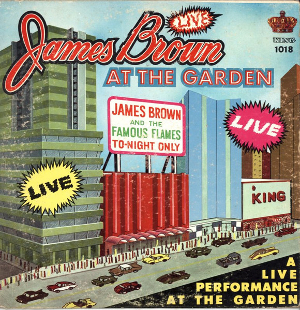
Live at the Garden is a 1967 live album by James Brown and The Famous Flames. It was recorded on January 14, 1967 in the middle of a ten-day engagement at the Latin Casino in Cherry Hill, New Jersey - Brown's first at an upscale nightclub. Like most of Brown's live albums, overdubbed crowd noise was added to the original recording for its LP release. It included one new song, "Let Yourself Go", which was recorded after hours at the casino; it appeared on the album disguised as a live recording. Although Live at the Garden peaked at #41 on the Billboard album chart, it came to be overshadowed in Brown's catalog by his next live album, Live at the Apollo, Volume II, recorded later the same year and released in 1968.
"I Guess I'll Have to Cry, Cry, Cry" is a song written and performed by James Brown. Released as a single in 1968, it charted #15 R&B and #55 Pop.

Tom & Mick were a Swedish band formed in 1965 in Enköping, Sweden. They were only active for three years though managed to release an album and a handful of singles, of which "Please, Please, Please" became their first hit. During their last two active years, they were fronted by Tommy Körberg (Tom) and Michael Johansson (Mick), one of the first dual-vocalist pop groups in Sweden at the time Retrospectively, they are best known for their single "Somebody's Taken Maria Away" which topped the Swedish charts, and for starting the career of Körberg, who would go on to become one of the most well known musicians in Sweden.

